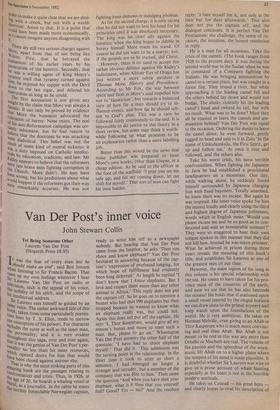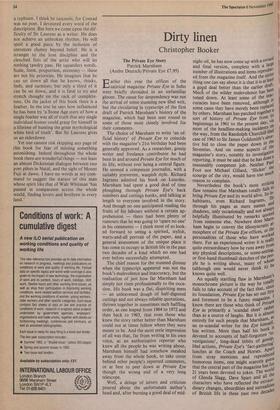Van Der Post's inner voice
John Stewart Collis
Yet Being Someone Other Laurens Van Der Post (Hogarth Press £8.95) It Was the fear of every man lest he When make an end', said Ben Jonson When listening to Sir Francis Bacon. That s:1. Ins up my own feelings whenever I hear Laurens Van Der Post on radio or "elevision such is the appeal of his voice, nobility of his spirit, and the scope of intellectual ntellectual address. Sir Laurens sees himself as guided by an inter voice. The rather awkward title of this b °°k, taken from some particularly porten- tous lines by T. S. Eliot, tends to narrow ?ur conception of his powers. For character tin, eludes the outer as well as the inner man, throughout Personality; and it is very evident that this saga, over and over again, lat It was the genius of Van Der Post's per- arialitY no less than his inner resources, Which opened doors for him that would have been closed against anyone else. That is why the most striking parts of this ‘,4,114zing book are the passages relating to the age and crisis. Thus, in 1926, at ie age of 20, he boards a whaling vessel at atal, as a journalist. In the cabin he meets the terribly formidable Norwegian captain, ready to write him off as a newspaper nobody. But hearing that Van Der Post came from the Interior, he asks 'Then you shoot and know elephant?' Van Der Post hesitated in answering because of the cap- tain's 'expression of profound longing, for which hope of fulfillment had evidently been long deferred.' At length he replied 'I don't know that I know elephants. But I love and respect them more than any other animal in Africa.' This reply does not put the captain off. So he goes on to mention a hunter who had shot 999 elephants but then stopped because he wanted to know what an elephant really was, but could not. Again this does not put off the captain. He says 'I, Thor Kaspersen, would give all my season's bonus and more to meet such a man. But, please to go on.' Whereupon Van Der Post answers the other half of the question: 'I have had to shoot elephant myself.' That did it. 'This admission was the turning point in the relationship. In the short time it took to utter so short a sentence, I had emerged no longer a stranger and intruder, but a member of the company that was elite to him.' Then came the question 'And when you have shot your elephant, what is it then that you yourself feel? Good? Yes — no?' And the resolute
reply: 'I hate myself for it, not only at the time but for days afterwards.' This also does not put the captain off, and the dialogue continues. It is perfect Van Der Postianism: the challenge, the sense of oc- casion, the intuition, the honest resolution in reply.
He is a man for all occasions. Take the crisis of the camels. (The book ranges from 1926 to the present day). It was during the second world war in the Sudan when he was in command of a Company fighting the Italians. He was bringing ammunition by camel to a certain place, but was caught in a forest fire. They found a river, but while approaching it the leading camel fell and the others behind lay down and would not budge. The sheiks violently hit the leading camel's head and twisted its tail, but with no result. What was to be done? Must they all be roasted or leave the camels and am- munition behind? Van Der Post was equal to the occasion. Ordering the sheiks to leave the camel alone, he went forward, gently tugged its head and said to it in Zulu 'In the name of Umkulumkulu, the First Spirit, get up and follow me.' At once it rose and followed, and the others also.
Take his worst crisis, his most terrible confrontation. When fighting the Japanese in Java he had established a provisional headquarters on a mountain. One day, while walking alone, he suddenly found himself surrounded by Japanese charging him with fixed bayonets. Totally unarmed, he knew there was no escape. But again he was inspired. His inner voice spoke for him (he insists) loudly and clearly using the third and highest degree of Japanese politeness, words which in English mean 'Would you please excuse me and be so good as to con- descend and wait an honourable moment?'
They were so staggered to hear their own tongue spoken in this manner that they did not kill him. Instead he was taken prisoner.
What he achieved in prison during three years reveals the meaning of this book's title, and establishes Sir Laurens as one of the greatest men of our time.
However, the main region of his song in this volume is his special relationship with the sea. He seems to have taken for his pro- vince most of the countries of the earth, and now we see that he has also bestrode the oceans! He holds that if stationed upon a small vessel centred by the ringed horizon we can draw close to the primal mystery and keep watch upon the foundations of the world. He is very ambitious. He takes on Herman Melville, even giving us an Ahab in Thor Kaspersen who is much more convinc- ing and real than Ahab. But Ahab is not meant to be real in this way any more than Othello or Macbeth are real. The volume of the passion and the splendour of the word- music lift Ahab on to a higher plane where the tempest of his mind is made plausible. It is doubtful whether Sir Laurens was wise to give us a prose account of whale hunting especially as his heart is not in the horrible modern methods.
He takes on Conrad — his great hero and clearly hopes to rival his description of
a typhoon. I think he succeeds, for Conrad was no poet. I devoured every word of the description. But here we come upon the dif- ficulty of Sir Laurens as a writer. He does not achieve an unbroken rhythm. He will spoil a good piece by the inclusion of sentences clumsy beyond belief. He is a stranger to the iron discipline and the clenched fists of the artist who will let nothing tawdry pass. He squanders words. Scale, form, proportion, economy — these are not his priorities. He imagines that he can set down all that he knows, thinks, feels, and surmises; but only a third of it can be set down, and it is fatal to try and stretch thought on the rack of complete- ness. On the jacket of this book there is a feather. In the text he says how influenced he has been by 'a Stone Age story of how a single feather was all of truth that any single individual hunter could grasp for himself in a lifetime of hunting the great mythological white bird of truth'. But Sir Laurens gives us an eiderdown.
Yet one cannot risk skipping any page of this book for fear of missing something astonishing. Indeed throughout the whole book there are wonderful things — not least an almost Dickensian dialogue between two port pilots in Natal, and the sight of Mount Fuji at dawn. I have no words at my com- mand to suggest the stature of this man whose spirit like that of Walt Whitman 'has passed in compassion across the whole world, finding lovers and brethren in every land.'















































 Previous page
Previous page